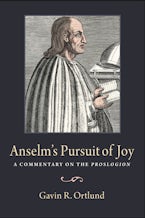Preparing your PDF for download...
There was a problem with your download, please contact the server administrator.
The interpretation of Anselm of Canterbury’s Proslogion has a long and rich tradition. However, its study is often narrowly focused on its so-called "ontological argument." As a result, engagement with the text of this work tends to be lopsided, and the prayerful purpose that undergirds the whole book is often completely ignored. Even the most rigorous engagements with the Proslogion often have little to say, for instance, about how the prayers of Proslogion 1, 14, and 18 contribute materially to Anselm’s argument, or how his doctrine of God develops organically from the divine formula in the early chapters to the doctrines of eternity, simplicity, and Trinity in later chapters. There are very few works that offer a sustained analysis to Anselm’s flow of thought throughout the entire Proslogion, and no one has explored how Anselm’s doctrine of creaturely joy in heaven in Proslogion 24-26 is a fitting climax and resolution to the book.
Anselm’s Pursuit of Joy attempts a sustained, chapter-by-chapter textual analysis of the Proslogion, and offers the first effort to situate Anselm’s doctrine of heaven in Proslogion 24-26 as the climax of the earlier themes of Anselm’s work. Gavin Ortlund suggests that the basic purpose of Anselm’s argument in the Proslogion is to seek the visio Dei that he articulates as his soul’s deepest desire ( Proslogion 1). While Anselm’s argument for God’s existence ( Proslogion 2-4) is an important piece of this effort, it is only one step of a larger trajectory of thought that leads Anselm to meditate further on God’s nature as the highest good of the human soul ( Proslogion 5-23), and then to anticipate the joy of possessing God in heaven ( Proslogion 24-26). In other words, the establishment of God’s existence is only the penultimate consequence of Anselm’s famous formula "that than which nothing greater can be thought"—his ultimate concern is with the infinite creaturely joy that is entailed by his existence. The Proslogion is, far more than an argument for God’s existence, a meditation on God as the chief happiness of the human soul.
Gavin Ortlund is senior pastor of First Baptist Church of Ojai in Ojai, California. He is the author of Theological Retrieval for Evangelicals and Retrieving Augustine's Doctrine of Creation.
"An original and compelling thesis. Ortlund demonstrates, through a close textual analysis grounded in the history of the medieval monastic tradition, that Anselm's more 'philosophical' treatises are actually part of a large repertoire of theological and spiritual writings with a unified theme."
~John Bequette, professor of philosophy at the University of St. Francis Indiana.
"Integrating and going beyond the all-too few studies that read Anselm's Proslogion holistically, Ortlund presents a fresh, insightful, fine-grained, gracefully written, and persuasive analysis of this text, showing how Anselm moves seamlessly from God understood as that than which nothing greater can be conceived to God as the source of a spiritual joy greater than can be imagined. An important contribution to Anselm studies."
~Marcia L. Colish, Yale University
"Anselm is one of the greatest Christian theologians, and the Proslogion is one of the greatest historic statements of Christian theology. Yet it is also one of the most enigmatic. What is Anselm aiming at in this work? How should we categorize this prayerful theology that appears to be so much like apologetics? Theological and philosophical minds have puzzled over these questions for centuries. In this study, Gavin Ortlund proposes a fresh way of thinking about the Proslogion that is properly theological, and that pays particular attention to the shape and content of Anselm's work, and to its intended goal. It is a monograph of the highest theological quality, from which I have learned a great deal."
~Oliver D. Crisp, University of St. Andrews
"Ortlund draws deeply upon Anselm's entire corpus and upon an extraordinary range of scholarship, including neglected European sources. He shows that the entirety of Anselm's Proslogion, including his famous proof, has for its purpose recalling us to the profound attraction of God and beatific communion with God. In this masterful interpretation, Anselm is the model of the theologian as lover of God, who discovers in the Trinity all for which our hearts yearn. In this book we find a theology freed from all trivializations of its task."
~Matthew Levering, Mundelein Seminary
"Down through the centuries, the vast majority of readers of Anselm’s Proslogion have shown an overwhelming interest in the "ontological argument" of chapters 2-4, often extracting it from its literary and historical contexts and simply adjudging the validity of its proof for God’s existence. Anselm’s Pursuit of Joy provides a necessary and refreshing corrective to this dominant interpretive tradition. By way of a holistic and contextual reading of the Proslogion, Ortlund insightfully and convincingly argues that the most basic and ultimate goal at which Anselm’s work aims is—far from a rational demonstration of the bare existence of God—the soul’s beatific vision of this same God."
~Franklin T. Harkins, Boston College
"With his greater focus on the final chapters and a broader reading of the text, Ortlund has provided a valuable service in helping to rebalance the hermeneutics of the Proslogion."
~Journal of Ecclesiastical History

